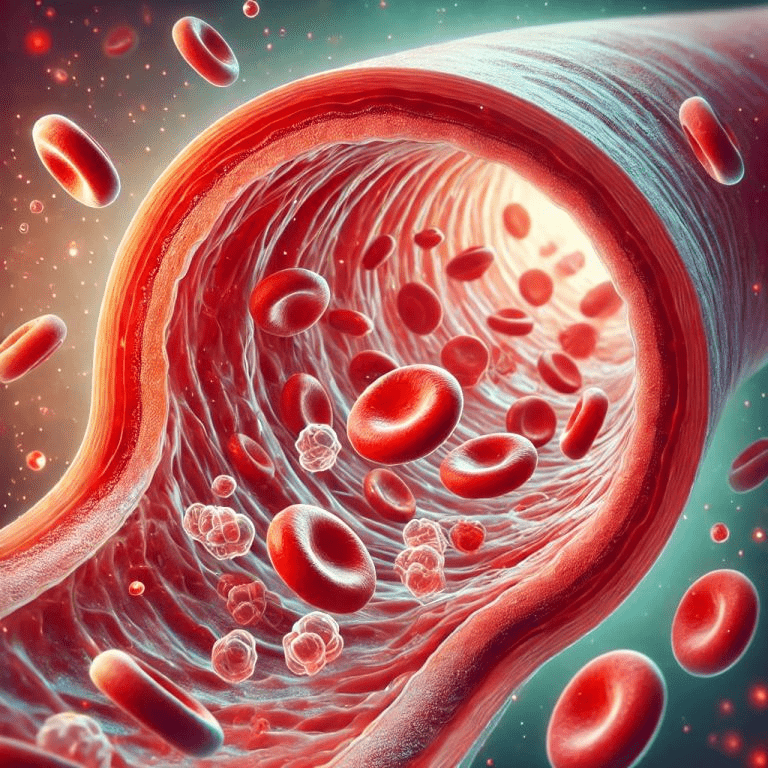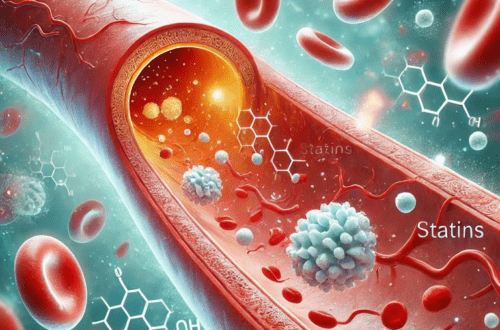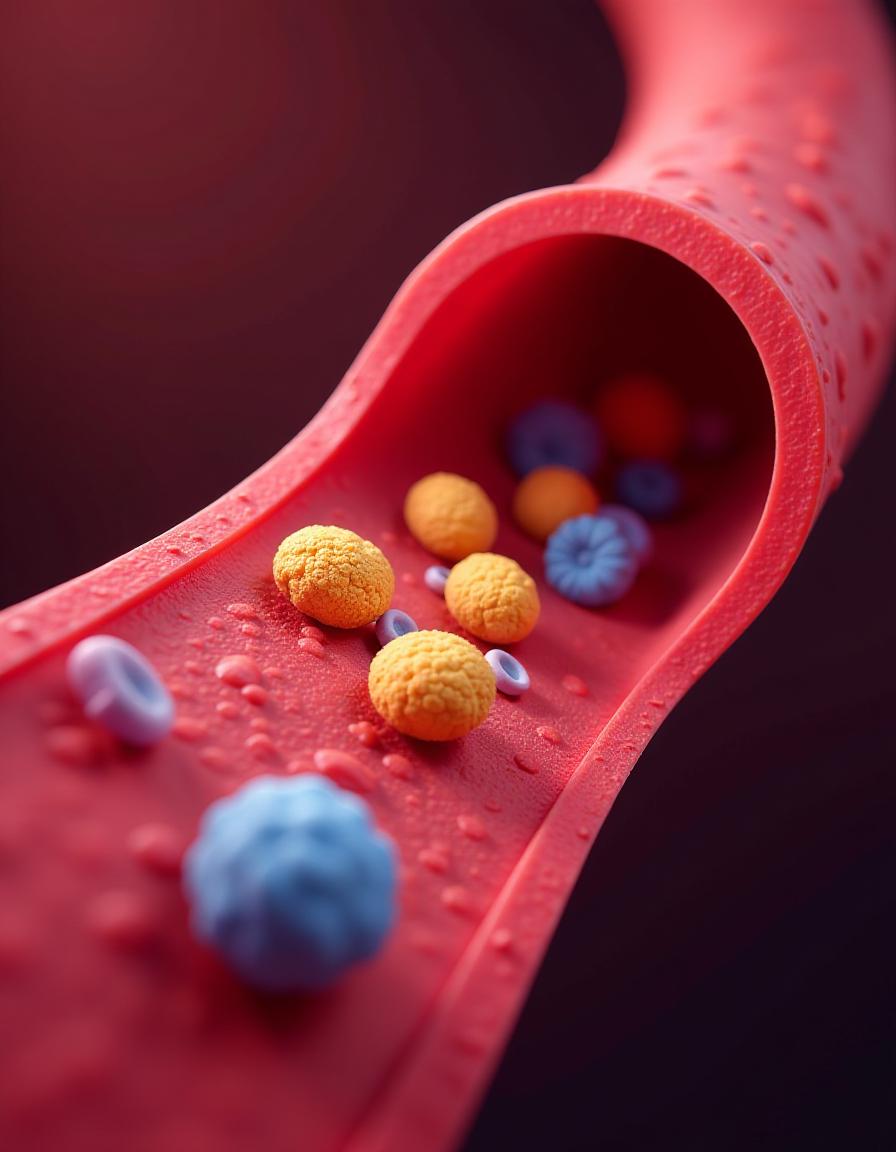The Importance of Cardiovascular Health
Cardiovascular health denotes the overall health of the cardiovascular system—the heart, blood vessels, and blood. It implies the proper and efficient functioning of these organs and the absence of cardiovascular diseases.
A healthy cardiovascular system has:
- A healthy heart that pumps blood effectively and beats normally
- Healthy blood vessels – clear arteries and veins without blockages
- A healthy blood pressure that is within the normal range
- Healthy cholesterol levels – low “bad” cholesterol (LDL and VLDL) levels and high “good” cholesterol (HDL) levels
Healthy lifestyle choices, such as a balanced diet, regular physical activities, relaxation, and abstinence from alcohol and drinking, are essential for promoting and maintaining cardiovascular health.
Cardiovascular disease (CVD) implies illnesses, impairments, or malfunctioning of the cardiovascular system due to one or more risk factors. Because the cardiovascular system is predominant in supporting life, any CVD requires early and proactive attention, diagnosis, treatment, and management to save lives and ensure quality of life.
Common cardiovascular diseases and risks include:
- Coronary artery disease
- Heart attack
- Stroke
- High blood pressure (hypertension)
- Atherosclerosis
- Peripheral arterial disease
- Congestive heart failure
- Arrhythmias
Several risk factors can lead to cardiovascular diseases:
- Hypertension
- High cholesterol
- Unhealthy diet
- Excessive alcohol consumption
- Smoking
- Diabetes
- Obesity
- Physical inactivity
- Family history and genetic factors
- Age
- Stress
Cardiovascular health is paramount for overall health, well-being, quality of life, and longevity. Cardiovascular diseases leading to lethal conditions such as heart attack and stroke are the leading causes of sudden and premature deaths worldwide. Other cardiovascular diseases result in increased morbidity and impaired quality of life.
Major Factors Affecting Cardiovascular Health
Cardiovascular diseases are linked to many external and internal factors, including lifestyle choices, genetic factors, medical conditions, medications, and environmental factors.
- Lifestyle choices: Certain diets containing high amounts of saturated and trans fats, processed foods, and sodium can cause high blood pressure and cholesterol levels, increasing the risk of cardiovascular diseases. Sedentary lifestyles with insufficient physical activity, stress, excessive alcohol consumption, and smoking are the leading factors that increase the likelihood of cardiovascular diseases.
- Genetic factors: A family history of cardiovascular diseases increases the risk of developing these conditions. Genetic predispositions are also crucial factors that make individuals susceptible to cardiovascular diseases.
- Medical conditions: Diabetes, thyroid disorders, and kidney disease can increase the risk of cardiovascular diseases. Sleep apnea is said to cause high blood pressure, increasing the risk of cardiovascular problems.
- Medications: Certain medications, such as corticosteroids and beta blockers, can increase the risk of cardiovascular diseases in certain individuals.
- Environmental factors: Water and air pollution and exposure to pollutants, such as heavy metals, industrial wastes, and environmental toxins can lead to cardiovascular diseases.
The Impact of Cardiovascular Diseases on World Health
- According to the World Health Organization (WHO), cardiovascular diseases cause an estimated 17.9 million deaths annually, representing 32% of global deaths.
- The prevalence of cardiovascular diseases is rising, particularly in developing countries, due to urbanization, globalization, and lifestyle changes.
- Cardiovascular diseases inflict a significant economic burden on healthcare systems worldwide. It can lead to loss of productivity, disability, and increased healthcare costs.
The Role of Statins in Managing Cardiovascular Health Issues
Statins are a class of medications with the primary function of lowering blood cholesterol levels. They are widely prescribed and used for treating and preventing several cardiovascular diseases, including:
- Coronary artery disease (CAD)
- High cholesterol
- Peripheral arterial disease (PAD)
- Reducing the risk of cardiovascular events such as heart attacks and strokes in people with high cholesterol or other risk factors
How Statins Lower Cholesterol Levels?
Statins primarily lower LDL cholesterol (“bad” cholesterol) levels by the following processes:
- HMG-CoA reductase inhibition: Statins are referred to as 3-Hydroxy-3-methylglutaryl coenzyme A (HMG-CoA) reductase inhibitors since they block the enzyme HMG-CoA, which is responsible for the production of cholesterol in the liver.
- Reduction in cholesterol synthesis: The inhibition of HMG-CoA reduces cholesterol synthesis in the liver.
- Increased LDL receptor activity: When cholesterol production decreases, the liver’s LDL receptors become more active and remove LDL cholesterol from the blood.
- Lowered LDL cholesterol levels: The above processes can cause statins to lower LDL cholesterol levels, preventing plaque buildup in the arteries that contribute to most cardiovascular diseases.
The Other Beneficial Effects of Statins on Cardiovascular Health
Apart from preventing cholesterol-induced cardiovascular diseases by lowering the “bad” LDL cholesterol levels, statins have other beneficial effects on cardiovascular health.
- Statins can help to improve the function of the endothelium, the lining inside blood vessels that plays a crucial role in regulating blood flow, blood clotting, and the immune response.
- Statins can help lower blood pressure, improving blood flow to the heart and brain.
- Statins can help stabilize atherosclerotic plaques, the deposits of fat, cholesterol, cellular waste products, calcium, and fibrin that build up inside the arteries, leading to the narrowing of the arteries and restricting blood flow. This stabilization prevents the rupturing of the plaque and the formation of clots, which may otherwise lead to heart attack and stroke.
- Statins can help reduce blood clotting by increasing the production of specific proteins that help break down blood clots and decreasing the stickiness of platelets, preventing them from sticking together to form clots. This reduces the risks of heart attack and stroke.
- Statins reduce the risk of heart attack and stroke for people with normal cholesterol levels by stabilizing atherosclerotic plaque buildup, controlling inflammation, and improving blood flow to the heart and brain. They also prevent recurring cardiovascular events in people who have already undergone severe cardiovascular conditions.
Preventing Cardiovascular Risks by Reducing Inflammation
Controlling inflammation is crucial for preventing plaque buildup inside arteries, improving blood flow, and enhancing cardiovascular health. Statins play a vital role in reducing inflammation in the blood vessels in the following ways:
- Statins help reduce oxidative stress, a condition that affects the endothelium and also causes inflammation.
- Statins support the production of nitric oxide in the endothelium. Nitric oxide helps to relax blood vessels and improve blood flow, which can help to reduce inflammation.
- Statins can modulate the levels of various inflammatory markers. These are substances produced by the body in response to inflammation onset and indicate the levels of inflammation. Lower levels of inflammatory markers are associated with reduced inflammation.
- Statins support the function of the endothelium, which can reduce inflammation.
The Efficacy of Statins in Managing Cardiovascular Risks
The efficacy of statins in managing cardiovascular risks has been well-established through numerous studies and clinical trials.
- A 2022 evidence report and systematic review (Chou et al., 2022) about the use of statins for the primary prevention of CVD in adults concluded that statin therapy effectively reduces the risk of all-cause mortality and CVD events in adults with increased CVD risk.
- Tonelli et al. (2011) conducted a systematic review of randomized trials to assess the efficacy of statins for primary prevention in people at low to moderate cardiovascular risk. The study suggests statins may be beneficial in preventing death and cardiovascular morbidity in this population.
- Another investigation study conducted in 2004 (Wilt et al., 2004) on the effectiveness of statin therapy in adults with coronary artery disease (CHD) conducted a meta-analysis of patients with CHD to determine the efficacy of statin therapy. The study found that statin therapy reduces mortality and morbidity in adults with CHD, even for those with low LDL cholesterol levels. This finding also indicates that statins improve cardiovascular health beyond reducing LDL cholesterol levels.
- Garcia‐Gil et al. (2017) conducted a population-based cohort study () to analyze the effectiveness of statins as primary prevention in people with differing levels of coronary heart disease (CHD) risk. It was found that statin therapy was effective in reducing the risk of atherosclerotic cardiovascular disease (ASCVD) across various risk levels, particularly in individuals with high adherence to treatment. However, statin treatment did not show significant benefits in individuals with low adherence to therapy, regardless of their risk level.
- Benner et al. (2005) conducted a clinical study to investigate the link between how well statins lowered LDL cholesterol within the first 3 months and how well patients adhered to their medication over time. The study found that statins effectively reduced LDL cholesterol in the short term, and a greater reduction was associated with better adherence to long-term lipid-lowering therapy.
Risk Factors and Side Effects of Statins
Despite their life-saving potential and generally favorable safety profile, statins can occasionally cause mild and transient side effects, both in the short and long term.
Their short-term side effects include:
- Muscle aches and pains
- Digestive problems, such as constipation, diarrhea, or heartburn
- Liver problems (rarely reported)
- Skin rashes
Since continuous statin action is necessary to maintain cardiovascular health, most statin therapies are prescribed for the long term. Some concerns have been reported about the potential side effects of long-term statin use. These include:
- Muscle damage, leading to muscle pain and weakness.
- Liver problems such as elevated liver enzymes.
- Some studies suggested rare chances of cognitive impairment, such as memory loss and concentration issues.
- Some studies suggested a slight increase in the risk for type 2 diabetes.
People undergoing long-term statin therapy are recommended to undergo regular monitoring of liver function and muscle enzymes and seek professional help upon experiencing any side effects.
It is important to note that reports about these side effects are rare, and the benefits of statins in reducing the risk of heart attack and stroke often outweigh the risks.
Conclusion
To sustain enduring cardiovascular health, the action of statins on the cardiovascular system should be maintained consistently throughout the treatment period. Adherence to long-term statin therapy is necessitated if the patient is susceptible to cardiovascular risk factors.
Overall, the benefits of statins in cardiovascular health management often outweigh the potential risks. Moreover, it is highly recommended that patients take this medication under medical supervision, follow individualized prescriptions, periodically monitor lipid levels, evaluate individual risk factors, and adjust statin dosage to match the body’s requirements.
Additionally, adopting a healthy lifestyle comprising a balanced, nutritional, fat-free diet, regular physical activities, relaxation, abstinence from alcohol and smoking, and eco-friendly living increases the effectiveness of cardiovascular health management, leading to longevity and well-being.
References
- Wassmann, S., Laufs, U., BäUmer, A. T., MüLler, K., Ahlbory, K., Linz, W., Itter, G., RöSen, R., BöHm, M., & Nickenig, G. (2001). HMG-COA reductase inhibitors improve endothelial dysfunction in normocholesterolemic hypertension via reduced production of reactive oxygen species. Hypertension, 37(6), 1450–1457. https://doi.org/10.1161/01.hyp.37.6.1450
- Chou, R., Cantor, A., Dana, T., Wagner, J., Ahmed, A. Y., Fu, R., & Ferencik, M. (2022). Statin Use for the Primary Prevention of Cardiovascular Disease in Adults. JAMA, 328(8), 754. https://doi.org/10.1001/jama.2022.12138
- Wilt, T. J., Bloomfield, H. E., MacDonald, R., Nelson, D., Rutks, I., Ho, M., Larsen, G., McCall, A., Pineros, S., & Sales, A. (2004). Effectiveness of Statin Therapy in Adults With Coronary Heart Disease. Archives of Internal Medicine, 164(13), 1427. https://doi.org/10.1001/archinte.164.13.1427
- Garcia‐Gil, M., Comas‐Cufí, M., Blanch, J., Martí, R., Ponjoan, A., Alves‐Cabratosa, L., Petersen, I., Marrugat, J., Elosua, R., Grau, M., & Ramos, R. (2017). Effectiveness of Statins as Primary Prevention in People With Different Cardiovascular Risk: A Population‐Based Cohort Study. Clinical Pharmacology & Therapeutics, 104(4), 719–732. https://doi.org/10.1002/cpt.954
- Tonelli, M., Lloyd, A., Clement, F., Conly, J., Husereau, D., Hemmelgarn, B., Klarenbach, S., McAlister, F. A., Wiebe, N., & Manns, B. (2011). Efficacy of statins for primary prevention in people at low cardiovascular risk: a meta-analysis. Canadian Medical Association Journal, 183(16), E1189–E1202. https://doi.org/10.1503/cmaj.101280
- Benner, J. S., Pollack, M. F., Smith, T. W., Bullano, M. F., Willey, V. J., & Williams, S. A. (2005). Association between short-term effectiveness of statins and long-term adherence to lipid-lowering therapy. American Journal of Health-System Pharmacy, 62(14), 1468–1475. https://doi.org/10.2146/ajhp040419





